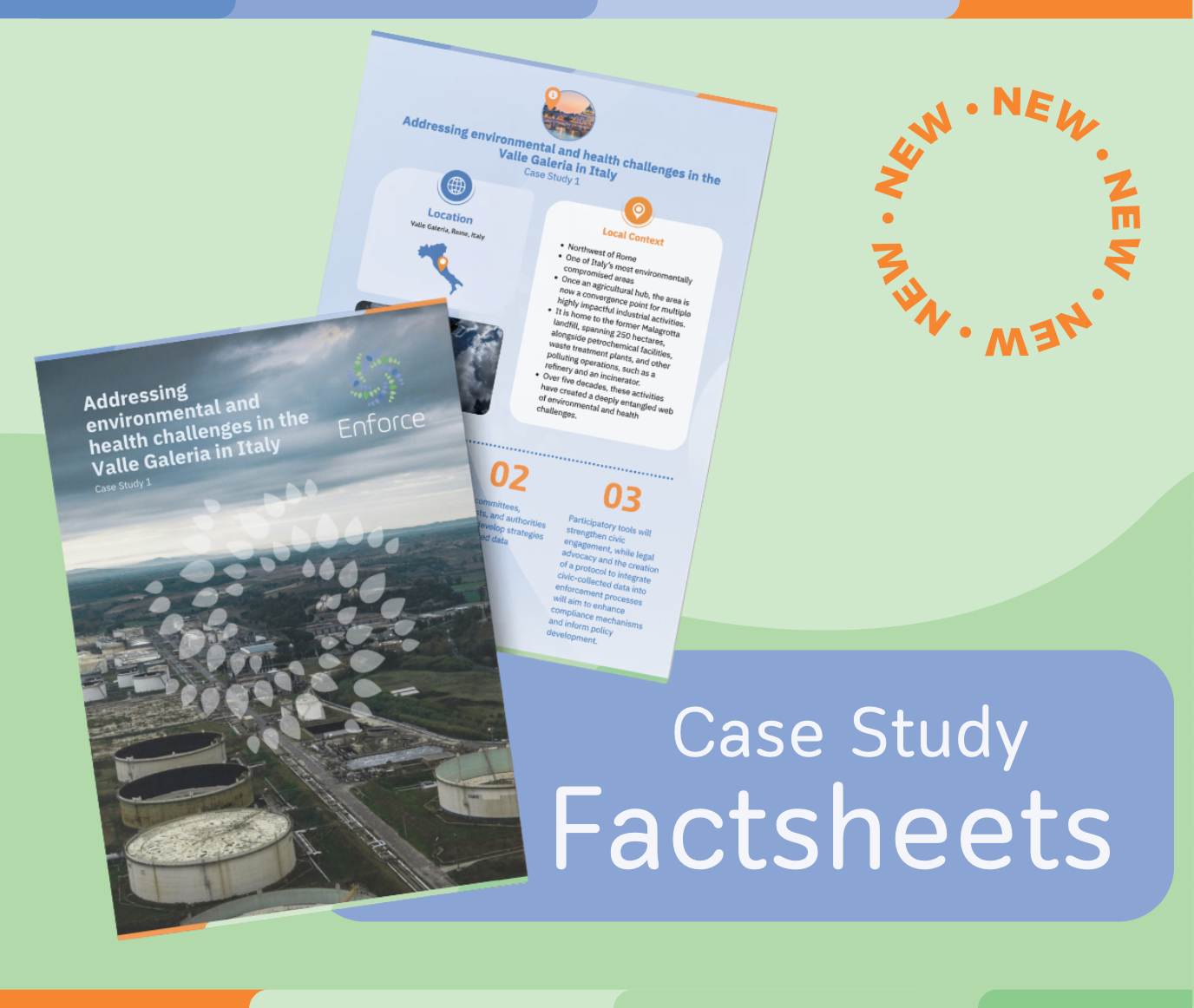Eight European Case Studies: ENFORCE Project Factsheets

The ENFORCE Project is enhancing environmental compliance across Europe by combining citizen science with innovative technologies. By integrating community-driven data collection with official monitoring, ENFORCE bridges the gap between local realities and regulatory requirements, empowering citizens, authorities, and researchers to work together for cleaner, healthier environments.
Starting in September 2025, ENFORCE will publish a series of Case Study Factsheets, each spotlighting one of the eight pilot sites across Europe. These factsheets will highlight the local challenges, approaches, and impacts of the project, and will serve as resources for communities, policymakers, and researchers seeking replicable models of environmental compliance.
Below you will find an overview of the case studies. As the factsheets are released, we will update this post with direct links.
Case Studies
Valle Galeria, Italy – Addressing environmental and health challenges
Once an agricultural hub, Valle Galeria (Rome) has become one of Italy’s most environmentally compromised areas, with a landfill, petrochemical facilities, and waste treatment plants leaving a lasting impact on health and ecosystems. ENFORCE is working with citizens, scientists, and authorities to map and systematise environmental data, monitor air and water quality, biodiversity, and fire hazards, and ensure that civic-collected data is recognised in enforcement. This approach aims to strengthen compliance, empower local communities, and serve as a model for community-led environmental advocacy.
Brașov, Romania – Enhancing sustainable forest management
Forests in Brașov are central to local identity and the economy but face threats from uncontrolled and illegal exploitation. ENFORCE is bringing together communities, forest owners, authorities, and the private sector to improve governance, reduce conflicts between public and private interests, and evaluate decision support systems (DSS) for sustainable forestry. A “living lab” will help validate and incorporate citizen science into forest monitoring, strengthening environmental compliance and contributing to the European Green Deal Data Space.
Crete, Greece – Preventing land clearing
Crete faces unregulated development, illegal quarrying, and land clearing that threaten biodiversity and alter landscapes. ENFORCE is developing tools to improve compliance, including a smartphone app, environmental crime database, and legal protocols. By engaging citizens, authorities, and courts, the case study aims to make environmental violations more visible and enforceable, while raising awareness of land use rules.
Barcelona, Spain – Safeguarding urban beaches through citizen engagement
Barcelona’s beaches face pressures from tourism, urbanisation, and pollution, despite recent renaturalisation efforts. ENFORCE is building a citizen-driven monitoring system focused on biodiversity and pollution, using tools like MINKA. Citizens are directly involved in monitoring marine biodiversity, cigarette butts, and wet wipes—three major issues affecting coastal ecosystems. By integrating citizen data into compliance frameworks, the initiative strengthens environmental governance and provides a replicable model for Mediterranean urban coastlines.
East Devon, UK – Mitigating agricultural impacts on water quality
Only 1 in 5 rivers in the West Country meet ecological standards, with agriculture and sewage as major sources of pollution. ENFORCE is combining citizen science monitoring (with over 100 active volunteers), remote sensing, and machine learning to better understand and manage water quality risks in the East Devon catchment. The project aims to generate actionable data for regulatory frameworks, engage farmers and local communities, and support healthier rivers aligned with the Water Framework Directive.
Puglia Region, Italy – Combating waste dumping and uncontrolled fires
In the Bio-distretto delle Lame, a rural area in Puglia, illegal waste dumping and stubble burning threaten ecosystems and communities. ENFORCE is working with local associations, municipalities, and farmers to design a roadmap for prevention and enforcement, while raising awareness among local actors. By strengthening collaboration and building monitoring mechanisms, the initiative aims to reduce waste and fire incidents, protect landscapes, and foster a culture of compliance.
Amsterdam, Netherlands – Enhancing biodiversity and ecosystem services
The Netherlands faces pollution and biodiversity loss across its water systems, but also has a vibrant citizen science community. ENFORCE is empowering citizens with tools such as Waag’s Making Sense methodology and Waarneming.nl to record biodiversity and pollution data and connect with policymakers. By strengthening citizen-authority collaboration, the project supports ecosystem restoration, improves the usability of open data, and contributes to EU biodiversity and water protection goals.
Flanders, Belgium – Improving soil remediation
In Antwerp, heavy industries have left communities exposed to PFAS and heavy metal contamination. ENFORCE is involving citizens in monitoring through phytoremediation trials, planting test crops, and using sensors to track pollutant transfer from soil to plants. These activities will create a citizen-based methodology for soil remediation and provide valuable data for regulatory thresholds. The initiative strengthens community engagement while contributing to safer soil and food systems.
Expected Impacts
-
Stronger enforcement of environmental laws at local and national levels.
-
Greater citizen engagement in environmental monitoring and reporting.
-
Scalable models for compliance on water, soil, biodiversity, forests, and pollution.






